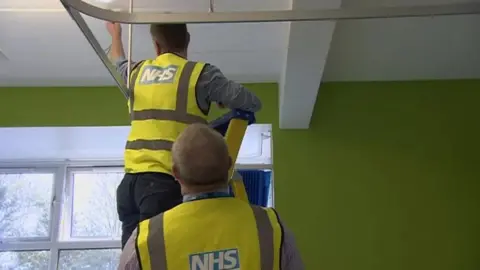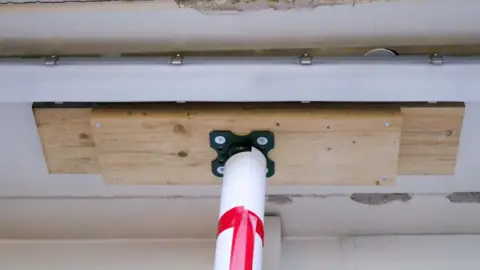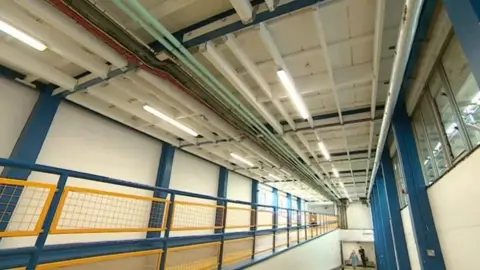Hinchingbrooke Hospital: Documents reveal catastrophic collapse risk
 BBC
BBCThe "likely" collapse of reinforced panels in a hospital could be "catastrophic", new documents reveal.
A risk assessment for Hinchingbrooke Hospital in Cambridgeshire found levels of concern over the use of Reinforced Autoclaved Aerated Concrete (RAAC).
The papers were obtained via a Freedom of Information (FOI) request by campaigner Minh Alexander.
She said it was "dreadful" that staff and patients "were expected to tolerate unacceptable risks".
Caroline Walker, chief executive for North West Anglia NHS Foundation Trust, said it was keeping "a very close eye on the RAAC structural issues".
"We are focusing on redevelopment plans for Hinchingbrooke which would see us build a new hospital on the site, thus eliminating our RAAC issues, by 2030," she said.

Reinforced planks made from RAAC have been used in roofs, floors and walls of NHS buildings and schools built in the 1960s and 1980s.
The material has serious weaknesses, as seen at the Queen Elizabeth Hospital in King's Lynn, where ceilings are supported by more than 2,400 props.
Ms Alexander, who has campaigned on the issue, published disclosures from a dozen NHS trusts and organisations affected by the RAAC problem, including North West Anglia, which operates Hinchingbrooke.
"It is dreadful that trust staff and patients have been expected to tolerate these unacceptable risks," she said, "and that trust staff have been forced to invest so much energy in managing dangerous, dilapidated buildings, instead of delivering care."

The risk document for Hinchingbrooke is similar to the one for West Suffolk Hospital in Bury St Edmunds, which the BBC obtained last year.
The true extent of the risk at the Cambridgeshire based hospital isn't known due to some of the RAAC panels not being surveyed because of access issues.
Also included in the FOI disclosure is a recently updated "risk action plan" and an "emergency evacuation plan".

An NHS England deadline to remove the panels from across its estate has also been brought forward five years to 2030, according to the papers.
North West Anglia published a business case last year to be included among eight trusts to be selected for funding as part of the government's New Hospital Programme.
The document states the hospital's main theatres are located in buildings constructed from RAAC which need to be replaced "as soon as possible because of the structural safety issues".
An announcement is expected in the coming weeks.
Ms Walker added: "The safety of our patients, staff and visitors is of the utmost importance to us.
"Our estates and facilities team are working on an ongoing rolling programme across the affected areas of the hospital site to ensure that we can be aware of any faults as soon as they arise, implement safety measures and carry out remedial works."
She said construction of a main seven-theatre block was already under way at the rear of the site.

Surveys across the NHS estate have revealed 34 buildings containing RAAC planks at 16 NHS trusts, according to a parliamentary answer in July.
The NHS has earmarked £685m to deal with risks relating to the use of the material at these sites, including structural surveys and the installation of "failsafe" measures to prevent collapse.
A Department of Health and Social Care (DHSC) spokesman said: "We have publicly committed to eradicating Reinforced Autoclaved Aerated Concrete (RAAC) from the NHS estate and protecting patient and staff safety in the interim period, with the NHS approaching this on a risk basis, prioritising NHS Trusts of concern".

Find BBC News: East of England on Facebook, Instagram and Twitter. If you have a story suggestion email [email protected]
